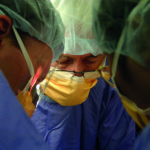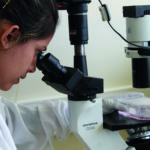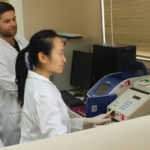Proudly Australian, the O’Brien Institute has spent over 45 years developing its craft and has produced some of the best microsurgeons and researchers in the world. Our researchers use their skills to give back form and function to people who have suffered trauma, the after-effects of disease treatment and congenital abnormalities, while pushing the boundaries in the science of tissue regeneration to help the body repair itself. Through passion, dedication, ongoing training and the support of the O’Brien Foundation, the O’Brien Institute provides patients with the hope that one day their lives may return to normal.
The O’Brien Foundation is an independent charity that exclusively supports the medical research undertaken by the O’Brien Institute. The Foundation is a non-for-profit administered by a board. It has tax free status and all donations are tax deductible.
Microsurgery is one of several medical fields in which Australia is a world leader. The steady flow of funds for research, equipment and infrastructure raised by the Foundation for the Institute over 45 years is one of the reasons for this pre-eminence.

Microsurgery
The best hope of today
Since 1972 the O’Brien Institute has worked to promote research and training in microsurgery. Supported by the O’Brien Foundation it has pioneered the application of microsurgical skills in reconstructive surgery. The Institute performed Australia’s first hand transplant and led the research to be able to replaced large areas of skin on patients ravaged by trauma, disease, or congenital abnormality. Our surgeons successfully re-attached a patient’s face after it was removed in a horrific accident. The O’Brien Institute has been acknowledged as a world leader in its field.

Regenerative Surgery Research
The hopes of tomorrow
We are working towards a new future that will provide patients with more successful outcomes and restore form and function, providing new hope. Our ambition is to totally change the direction of the reconstructive process of injured tissues and organs by stimulating them to repair and rebuild themselves, replicating the process of embryotic growth.
We have isolated stem cells in fat tissue that have the capacity, given the right signals, to replicate themselves more than a thousand-fold and to switch into mature cells specific to those that have been lost. This process can be enhanced by combining the cells with scaffolds to create three- dimensional form. We call this Tissue Engineering or Regenerative Surgery.
Together with St Vincent’s Plastic Surgery unit, we performed the world’s first Phase 1 clinical trial to regenerate a breast from fat in post mastectomy patients. This research is ongoing subject to increased funding. We are using similar methodologies, to achieve beating heart and liver tissues “grown in a dish”.
We are extending these techniques to help patients with gene abnormalities that cause birth deformities. With unique access to human tissue samples, our researchers can analyse samples using new gene sequencing technologies, proteomics and metabolomics to interpret their meaning with sophisticated bioinformatics in collaboration with Walter and Eliza Hall Institute, Bio21, University of Melbourne and US centres.
Already we have detected genes that may explain Lipodema, a debilitating hereditary condition causing painful, abnormal fatty tissue distribution. Identifying the responsible gene will lead to the development of a blood test marker for early detection and potentially a cure. Future research will teach us more about the mechanism of fat growth that we can be applied to the causes of obesity.

Training
The next generation of ground-breakers
raining is central to our work. We have been training surgeons and research fellows from Australia and overseas for over 45 years. We are equipping them with skills to perform lifesaving surgery and inspiring them to break new research ground. It is our responsibility to maintain the highest standards of training so that it can provide the ‘ground-breakers’ of tomorrow with a platform of knowledge on which to build for the future.

